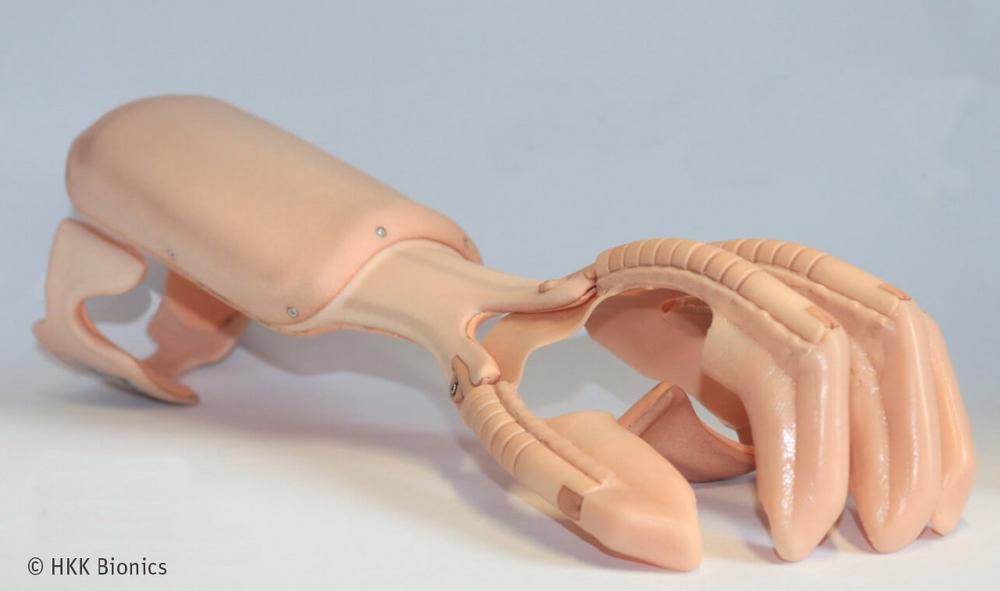High Demands on Performance and Safety
The sophisticated technology of the orthosis places high demands on the power supply. After all, according to the two founders, the device should be able to be used by patients throughout the day. The demands on the capacity of the battery are correspondingly high. At the same time, the power supply must be as light as possible so as not to unnecessarily stress the wearer of the orthosis. Additionally, the highest safety standards apply, as the product is to be worn directly on the body from morning to evening.
In their search for the right battery solution for this complex requirement profile, the founders relied on the help of Jauch Quartz. It thus turned out very soon that only a lithium battery would be able to satisfy the founders’ needs.
Thanks to the low dead weight of lithium, these batteries are significantly lighter than the widely used alkaline or nickel-metal hybrid batteries, for example. In addition, lithium batteries have a higher energy density and a higher cell voltage. Accordingly, a manageable number of battery cells connected in series or in parallel is sufficient to cover the power requirements of the orthosis – which also saves weight.
Not all batteries are the same
The decision for a lithium battery, however, means just the beginning of the selection process. “There is a large number of different cell chemistries with specific properties, which have to be selected correctly for use in different application areas,” says Sönke Zacher, project manager at Jauch who accompanied the development of the power supply for the orthosis.
Lithium manganese dioxide cells, for example, are particularly suitable for applications where the power requirement fluctuates to a large extent over time due to their very good pulse performance. A typical application would be a portable defibrillator that can be found in numerous public buildings. In sleep mode, these devices consume almost no power at all, but require maximum performance immediately in case of an emergency. With a voltage of 3 Volt, lithium manganese dioxide cells have twice the voltage of alkaline batteries and very low self-discharge, ensuring reliable supply of the capacitors that generate the strong current pulses of the defibrillator.
Lithium thionyl chloride cells have an even higher voltage of 3.6 Volt and the highest energy density among lithium primary cells. Nevertheless, these batteries are mainly found in applications that require a constant low power supply over a longer period of time. “The reason for this is the so-called ‘passivation’ of the battery. This is a chemical reaction within the battery cell that forms a protective film over the lithium anode of the battery. On the one hand, this protective film ensures low self-discharge and a long shelf life, but on the other hand it impedes the ion flow and thus causes a voltage drop,” explains Sönke Zacher.
The Solution: A Powerful Lithium-Ion Battery
Lithium manganese dioxide and lithium thionyl chloride cells are both included in the portfolio of the “Jauch” battery brand. However, both cell types are primary cells that cannot be recharged after a single discharge and must be disposed of. For this reason alone, their use for the start-up’s orthosis does not appear to be optimal. Instead, rechargeable lithium-ion batteries are used.
Lithium-ion batteries are superior in performance to the primary cells mentioned above. This is due both to the high cell voltage of 3.6 volts and the low internal resistance of the cell, which – depending on the cell type – can lead to extremely high discharge currents of up to 30 amperes.
In the case of the hand orthosis from HKK Bionics, several lithium-ion round cells are finally connected to form a powerful accumulator.
Jauch Takes Care of Protection Electronics and Certification
However, battery development is not finished yet. “As powerful as lithium-ion batteries are, they react sensitively to overcharging, deep discharging or short circuits. In the best case, ‘only’ the service life of the battery is negatively affected, in the worst case it is safety-relevant. Therefore, special precautions and protective measures are necessary,” explains Sönke Zacher.
The so-called “battery management system” (BMS) serves this purpose. The BMS monitors the condition of the individual battery cells and automatically interrupts the circuit if specified limit values are exceeded. Practical functions such as the battery charge level indicator are also controlled via the BMS. The programming of the BMS is an essential part of the development work and is also carried out by Jauch.
For many applications, lithium batteries must meet high safety standards, which are tested by independent test laboratories. In the case of the orthosis, proof of the passed IEC62133 standard was a prerequisite for use in the start-up’s orthosis.
Jauch Quartz GmbH is a specialist for frequency control products and battery technology. The product portfolio of the family-owned company founded in 1954 includes high-precision crystals, oscillators and MEMS oscillators. In addition, the medium-sized company has made a name for itself as a reliable distribution and development partner for battery solutions. The company focuses in particular on lithium batteries.
With its subsidiaries in France, Great Britain and the USA, Jauch Quartz GmbH has a worldwide distribution network.
Jauch Quartz GmbH
In der Lache 24
78056 Villingen-Schwenningen
Telefon: +49 (7720) 945-0
http://www.jauch.com
Head of Marketing
Telefon: +49 (7720) 945-157
E-Mail: Patricia.Schifferdecker@jauch.com
![]()
